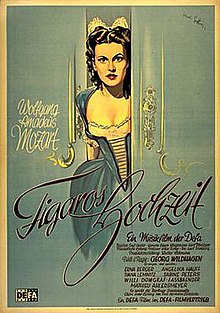| The Marriage of Figaro | |
|---|---|
 | |
| Directed by | Georg Wildhagen |
| Written by |
|
| Produced by | Walter Lehmann |
| Starring | |
| Cinematography | |
| Edited by | Hildegard Tegener |
| Music by | Wolfgang Amadeus Mozart |
Production company | |
| Distributed by | Progress Film |
Release date |
|
Running time | 107 minutes |
| Country | East Germany |
| Language | German |
The Marriage of Figaro (German: Figaros Hochzeit) is a 1949 East German musical film directed by Georg Wildhagen and starring Angelika Hauff, Willi Domgraf-Fassbaender and Sabine Peters.[1] It was based on the opera The Marriage of Figaro by Wolfgang Amadeus Mozart and Lorenzo Da Ponte, which was itself based on the play The Marriage of Figaro by Pierre Beaumarchais. The film was made by DEFA, the state production company of East Germany, in their Babelsberg Studio and the nearby Babelsberg Park. It sold 5,479,427 tickets.[2]
The production used a German text instead of the Italian original. The recitatives were replaced with dialogue spoken by the actors. Except for Willi Domgraf-Fassbaender as Figaro and Mathieu Ahlersmeyer as Count Almaviva, the singing parts were supplied by opera singers.[3] During Figaro's aria "Non più andrai" (In German: "Nun vergiss leises Flehn"), a battle scene from Veit Harlan's 1942 film The Great King is shown.
- ^ Davidson & Hake, p. 238
- ^ List of the 50 highest-grossing DEFA films.
- ^ Figaros Hochzeit, Lexikon des internationalen Films, Zweitausendeins